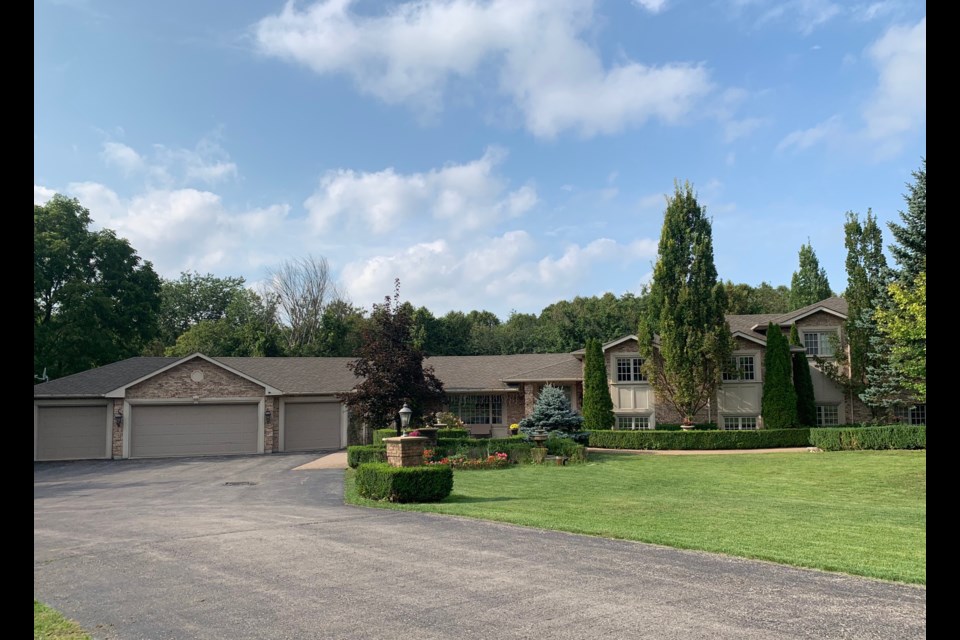An Airbnb-listed “party house” in an exclusive Newmarket enclave has been the first significant test of the town’s stringent new short-term rental bylaw.
Booming music, live DJs, close to 100 party-goers, “a fair amount of drinking going on”, speeding cars on surrounding streets and “partying until the wee hours” have been a concern in the quiet neighbourhood all summer, said nearby resident Dan O’Toole of the spacious home at 1149 Druery Court near Mulock Drive and Leslie Street.
“The person who owns it has decided to turn it into a destination location. So, for $2,500 a night you can take advantage of that property,” he said.
The Town of Newmarket has issued a warning to the property owner, according to Flynn Scott, manager of regulatory services.
“It’s an extremely challenging situation for the people who live in that area,” Newmarket Mayor John Taylor told NewmarketToday. “But we have put in place a new short-term rental bylaw and penalty system to address the situation that too many neighbourhoods, too many streets, in Newmarket were facing with very disruptive party houses.”
Weddings, anniversaries and religious celebrations have been held at the house, according to O’Toole, as if it is a “banquet hall.”
“It’s a significant commercial enterprise in a residential area,” he said.
“My main concern is alcohol, driving too fast and we’ve already had an incident in town with shots fired,” he said. “I said to (York Regional Police), ‘Are we waiting for gunshots?’”
A Toronto man was killed, and a woman injured, in a brazen shooting outside a Colter Street house listed on Airbnb in October 2019.
York Regional Police visited the residence twice in August in response to complaints about noise and the number of people gathered, but no charges were laid, Sgt. Andy Pattenden said.
Police can lay charges under the province's Emergency Measures And Civil Protection Act, which permits fines and imprisonment for non-compliance of orders regarding public events and social gatherings during the COVID-19 pandemic.
“When we receive calls regarding noise, our officers attend on a call priority basis,” Pattenden said. “If there is still noise after the time prescribed by the local bylaw, then officers will usually ask for the noise to stop. There are times when we are called back if the noise resumes, then officers can determine if they lay charges.”
The executive custom-built five-bedroom house is on 2.4 acres overlooking a wooded ravine on a private court with two other houses, and was listed on Airbnb for $2,500 a night.
“This Is The Perfect Retreat For Those Seeking Serenity And Privacy,” a 2016 real estate listing declared.
Scott said he is unable to comment specifically about the Druery property because it is an open investigation, but he confirmed the property owner has been contacted requesting voluntary compliance.
“One thing that is crystal clear is that you’re not permitted to operate a venue or any type of commercial activity at an Airbnb … short-term rentals are not meant for venues, or weddings, or engagement parties, or anything like that. So that part of any complaint would be shut down immediately,” Scott said.
Under the town’s new bylaw — the first to regulate short-term rentals — a licence is required. The application process for the licences opened Aug. 1.
Since the bylaw came into force in June, the town has been focusing on “education first”, while proactively investigating online advertisements to inform property owners about the need for a licence, Scott said.
About 10 properties have currently been identified, he added.
Restrictions include a maximum of six guests and three bedrooms “to avoid the party house situation” and that an owner or longtime tenant must reside at the house, Scott said.
“It really is a room rental scenario … you can’t rent out the entire home and host a big party.”
If complaints are received, the owner or tenant on site has two hours to respond.
“If we find a party house is going on, and they say the guests aren’t actually sleeping there, we have a lot of tools available to us, in terms of noise and parking regulations, things like that, that have also been built into the bylaw,” he said.
A $300 ticket can be issued if a response isn’t received within the two-hour limit.
Multiple fines can be compounded ranging from $2,000 to $2,500 per day, Scott said.
A third-party data searching company identified Newmarket has about 180 short-term rental properties — “That’s relatively on the high side,” Scott said — with more than half of those offered as entire house rentals, which is no longer permitted.
Many of the rentals are in the area of Southlake Regional Health Centre.
Until now, the town simply hasn’t had “the tools” it needed to address complaints about short-term rentals, Scott said.
“We have every intention of using the bylaw to the fullest extent when justified, in conjunction with AMPs,” the mayor said. “These relatively new tools to the Town of Newmarket combine to be a very forceful enforcement opportunity.”
AMPs (administrative monetary penalty system) allows municipalities to issue fines and collect them directly through property taxes, without being required to go through the provincial court system.
“I’m very confident that when people are abusing short-term rentals and impacting a neighbourhood, that we can take swift and strong action,” Taylor added.
Residents are encouraged to contact the Town of Newmarket with any concerns regarding short-term rentals in their neighbourhoods.
